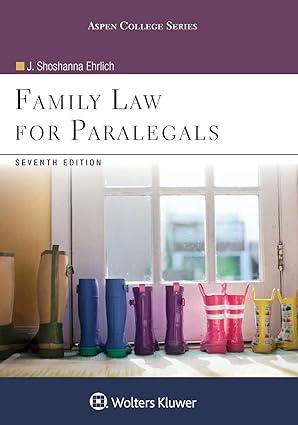In 1994, Father was arrested for sexually assaulting Amy, who was eleven years old at the time.
Question:
In 1994, Father was arrested for sexually assaulting Amy, who was eleven years old at the time. He was ultimately convicted of aggravated indecent assault and has been incarcerated for that crime since August 1994. Father . . will be released by August 2004. In May 1997, Father petitioned the trial court for modification or termination of the November 1992 support order. The thrust of Father's argument is that his support obligation should be modified or terminated because he is unable to pay due to his imprisonment and the inadequate wage he earns. To give effect to the requirement of reasonable financial support, the Pennsylvania Rules of Civil Procedure provide a comprehensive set of guidelines for the appropriate amount of child support to be contributed by each parent. generally Pa. R.C.P. No. 1910.16-1 to 1910.16-7. This Court has never directly addressed whether incarceration, standing alone, is a "material and substantial change in circumstances" that provides sufficient grounds for modification or termination of a child support order. A review of cases from other jurisdictions, however, reveals a wealth of case law that can be loosely categorized into three groups, each of which represents a different approach to assessing the effect of incarceration on support obligations. The first approach, dubbed the "no justification" rule, generally deems criminal incarceration as insufficient to justify elimination or reduction of an open obligation to pay child support. Thurmond, 962 P.2d at 1068-70; Halliwell, 741 A.2d at 644 . The second approach, known as the "complete justification" rule, generally deems incarceration for criminal conduct as sufficient to justify elimination or reduction of an existing child support obligation. Thurmond, 962 P.2d at 1070-71; Halli-well, 741 A.2d at 644-45. Finally, the third approach is the "one factor" rule, which generally requires the trial court to simply consider the fact of criminal incarceration along with other factors in determining whether to eliminate or reduce an open obligation to pay child support. Thurmond, 962 P.2d at 1071-72; Halli-well, 741 A.2d at 645. The fundamental disagreement between those courts applying a "no justification" rule and those adopting one of the other two rules hinges on whether relief should ever be granted to incarcerated parents. It appears that each court's ultimate conclusion on this issue is driven by three underlying considerations: (1) whether allowing relief to an incarcerated parent serves the best interests of the child, (2) whether relief is in accord with fairness principles, and (3) whether it is appropriate to treat incarceration in the same manner as voluntary unemployment.....
Questions:
1. What are the three approaches that jurisdictions take with respect to whether incarceration justifies relief from a child support obligation?
2. What approach does the court adopt?
3. What considerations underlie this approach?
4. As reviewed here, what views do other courts take with respect to these considerations?
5. At the end of the decision, the court notes that the result is "particularly appropriate" given that the father's incarceration stems from his sexual assault of his daughter - how significant do you think this factor is? Do you think the result would have been the same if the incarceration was for a reason unrelated to his family? Will this be a distinguishing factor in the future.
Step by Step Answer:






